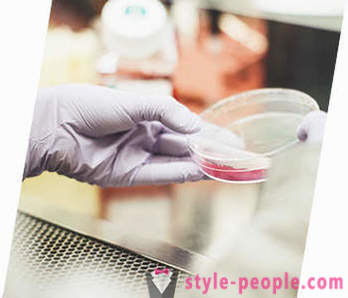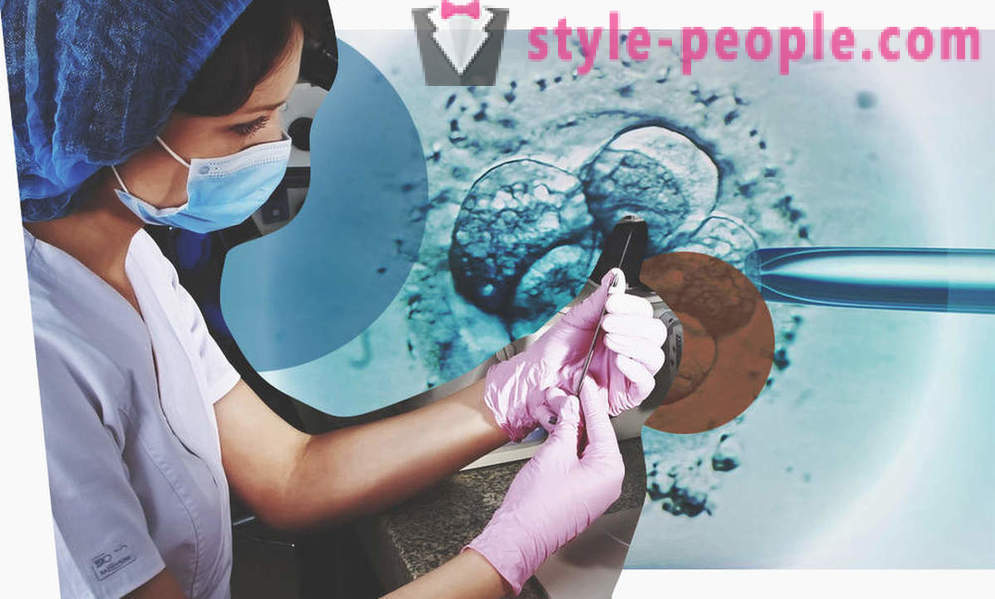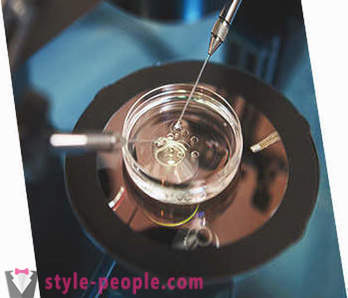5 modern ways to have a baby if you are infertile
According to the Russian Ministry of Health, currently in Russia for more than 17% of couples faced with infertility. Many families try in vain to have a baby without resorting to a health care professional, but the longer they pulled visit to the doctor, the more difficult it becomes to achieve the goal of maternity and paternity. Today, thanks to modern assisted reproductive technologies, most couples can become parents.
We met with the experts of the Center of Assisted Reproductive Technologies "AltraVita" and learned about possible alternative methods of infertility treatment, which will help you to conceive a child.

The first step to overcoming fertility problems is the understanding of the causes of infertility in a couple. The diagnosis of infertility for women under the age of 35 years means you can not get pregnant for a year without contraception for women over 35 years - a period of six months.
The causes of infertility are quite diverse. You may be surprised, but in 30-40% of cases occurs male factor infertility, so it is important to survey you were with a partner. The most common factors leading to infertility in men are problems with the quality of sperm, testosterone deficiency, abnormal ejaculation, as well as varicocele - varicose veins of the spermatic cord, which leads to disruption of the formation of sperm.
Women tend to face a wide range of obstacles to pregnancy. One of the most common factor infertility is tuboperitoneal - a violation of the Fallopian tubes or their absence due to various surgical interventions on the small pelvis. This is followed by infertility associated with lack of ovulation in women, which may be caused dyshormonal phenomena, polycystic ovary syndrome, syndrome of resistant ovary. Also one of the common obstacles of pregnancy is different prevalence endometriosis. Below are the program of assisted reproductive technology, which is worth knowing if you are faced with the problem of fertility:
1. Stimulation of ovulation

The method involves taking drugs to stimulate the ovaries, which increases the chance of conception through natural intercourse or artificial insemination.
Indications: hormonal dysfunction, polycystic ovary syndrome, preparation for in vitro fertilization, long-term use of combined oral contraceptives, which was complicated by inhibition of ovarian function, an increased amount of male sex hormones in the patient's blood.
Contraindications: ovulation ovarian stimulation is not carried out in case of detection of endometrial pathology, acute inflammatory processes in the pelvic organs, obstruction of the fallopian tubes, as well as male infertility.
What examinations must pass: survey of the therapist, ECG, ultrasound of the pelvic and breast. Examination of the Fallopian tubes by laparoscopy or radiography, or by ultrasound, chest x-rays, blood and urinalysis, smears from the vagina, cervix and urethra to atypical cells, and purity.
The essence of the method: The most simple method - the appointment of hormonal pills to stimulate ovulation. If the drug is ineffective, may require a small dose injections of gonadotrophins - hormonal drugs that stimulate the growth of a follicle in the ovary of a patient.
2. Insemination

insemination - a method of treatment of infertility, the most similar to natural conception. This program assisted reproductive technology is one of the first that a woman can try if natural conception was not successful. Before artificial insemination patients prescribed hormonal drugs that stimulate ovulation. This increases the chances of pregnancy. An important condition for carrying out the program of artificial insemination is the permeability of the fallopian tubes. Indications: In the program of artificial insemination can be used sperm spouse or sperm donor. In the first case, a woman's partner sperm, in the second - the sperm of an anonymous donor from a sperm bank. Homologous insemination can be used if the ejaculate too few sperm or sperm are mobile enough, and infertility of cervical origin. Artificial insemination with donor sperm is worth considering if the woman's partner is sterile or has a serious hereditary disease, as well as in identifying the incompatibility of the couple at conception.
Contraindications severe mental illness, severe uterine pathology, ovarian tumors, cancer and inflammation.
What examinations must pass: the patient need to undergo blood tests, smears on the flora, onkotsitologiyu and genital infections, blood chemistry and coagulation, ultrasound of the thyroid and mammary glands, ECG, echocardiography, chest X-rays and a consultation with mammalogy physician, endocrinologist, and therapist.
The essence of the method: Insemination involves injecting healthy concentrated, pre-prepared andrologists sperm donor's spouse or the mother in the cavity of the uterus shortly before or the day of ovulation. This reduces the time and distance of travel of the sperm to the egg, which facilitates the process of fertilization. ovulation moment determined by a physician using an ultrasonic scanning and the analysis of blood hormone levels. The doctor inserts it into the uterus using a soft catheter. So much faster sperm reach the goals and meet the egg.
3. In Vitro Fertilization

In Vitro Fertilization (IVF) is a high-tech program of overcoming infertility. The method is considered one of the most effective ways to treat the lack of pregnancy in a pair in the world: the pregnancy rate with IVF is on average 47%. Usually, a woman's body is formed by one egg for the entire period of the menstrual cycle, but the IVF program is aimed at growth and development of the maximum number of follicles in the ovaries to produce the greatest number of good quality eggs, which are then fertilized.
Indications: in women is - pathology of the fallopian tubes and their absence as a result of surgical operations on the pelvic organs, anovulatory menstrual cycle, severe external genital endometriosis, polycystic ovary syndrome, in men - a pathology of sperm, organic pathology of the male reproductive functions dishormonal phenomena, as well as genetic sterility factor.
Contraindications is strictly forbidden to carry out IVF in the presence of diseases such as pulmonary hypertension, aplastic anemia, hyperparathyroidism, malignant tumors.
What examinations must pass: before the procedure, doctors recommend prospective parents to check the state of health, in particular, pelvic ultrasound, ultrasound of the thyroid, breast ultrasound, clinical and laboratory examination of the couple, which includes a variety of analyzes, including blood tests for HIV, syphilis, hepatitis B and C.
The essence of the procedure: During IVF ova retrieved from the follicles using a special transvaginal puncture needle and fertilized in vitro. The procedure can be performed using native oocytes and sperm partner or donor. Next, the resulting embryos for further growth and development are placed in an incubator with a nutrient medium and left there for several days. Then the embryo is transferred into the cavity of the uterus to the patient. The efficiency of the IVF program, the outcome, i.e. a long-awaited pregnancy is determined by a blood test for the concentration of human chorionic gonadotropin. Typically, tests are carried out 14 days after the embryo transfer into the uterus. Even with the positive results we should not forget that in the first trimester miscarriage risks are high enough, for this reason it is important to monitor the state of health and be registered for pregnancy obstetrician-gynecologist.
4. Spiking thawed embryos

Krioperenos embryos - is the transfer of thawed embryos in the uterine cavity of the patient's natural cycle, if ovulation in a woman is saved or in a series of hormone replacement therapy. This method also increases the pregnancy rate as excluded stage stimulation and transvaginal ovarian puncture. Usually frozen embryos from a previous IVF cycle, or is donated embryos. The advantages of the method: freezing embryos allows you to repeat the program of assisted reproductive technologies, if for some reason IVF attempt failed. The embryos are kept in cryostorage specialized where optimal conditions for the maintenance of viability for an indefinitely long period. This enables the use of embryos in the future, if you and your partner want to have a second child.
5. Surrogacy

Surrogate motherhood - conception method, which requires the participation of three parties: the intended parents and the surrogate mother who agrees voluntarily or for a specified amount to bear and give birth to a child for the couple. Surrogate mother could be any woman between the ages of 20 to 34 years, physical and mental health, in the presence of own healthy child.
Indications: Typically, women resort to the method of surrogacy for the following reasons: severe pathology of endometrial, congenital uterine abnormality or absence of the uterus due to hysterectomy, when the pregnancy is associated with a risk for the life of the woman, as well as the multiple unsuccessful IVF or frequent miscarriages. What examinations must pass: Applicants to the surrogacy program must pass a series of studies confirming the excellent state of health, in particular the inspection and obstetrical consultation, blood tests, coagulation, urinalysis, a smear of cervical channel and urethral cytology scraping from the cervix, breast ultrasound and pelvic organs, electrocardiogram and chest X-rays.
The method embryo transfer, patients belonging in the cavity of the uterus of a surrogate mother in the cycle of hormone replacement therapy.
How treatable infertility, how to treat it, how to start, how long it will take time - can accurately answer specialist. Treatment of patients in the clinic "AltraVita" is held under the supervision of professionals of different specialties: Human Reproduction, embryologists, endocrinologists, urologists, geneticists, psychiatrists and obstetricians. Most of them have advanced degrees and have international certificates. The clinic organizes various programs of infertility treatment, after careful examination of experts will select the most suitable program for you assisted reproductive technologies to help understand all the nuances of the treatment and to plan the next cost. "AltraVita" works by western standards: separation of ECO is equipped with one of the best in Europe embryology laboratory. With the latest equipment and the introduction of the American system of quality control of the work of embryologists have achieved incredibly high statistics. The probability of fertilization with the first IVF attempt reached 50%. This figure is higher than the average in Russia, Europe and the United States. Appointments













































